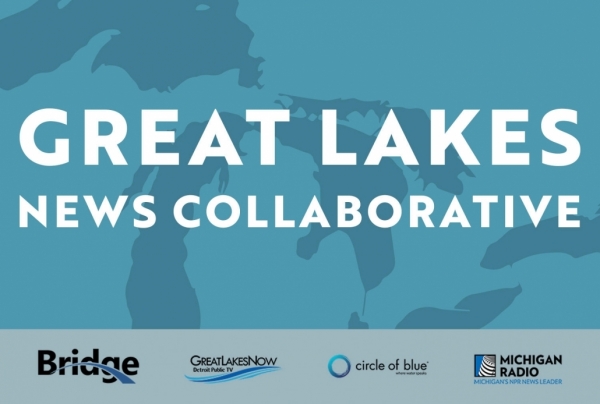Fresh, February 6, 2024: Biden Administration Offers $1.5 Billion Loan to Reopen Nuclear Reactor on Lake Michigan’s Shores
February 6, 2024
Fresh is a biweekly newsletter from Circle of Blue that unpacks the biggest international, state, and local policy news stories facing the Great Lakes region today. Sign up for Fresh: A Great Lakes Policy Briefing, straight to your inbox, every other Tuesday.
— Christian Thorsberg, Interim Fresh Editor
This Week’s Watersheds
- The Biden administration has promised a $1.5 billion loan to restart a nuclear power plant in Covert Township, Michigan.
- A new study reveals that a concerning amount of pharmaceutical pollution is contaminating the St. Lawrence River.
- Ohio has announced a new statewide partnership aimed at destroying PFAS-contaminated firefighting foam.
- A $1.4 billion barricade will be built on Illinois’ Des Plaines River to prevent the spread of invasive carp.
The Bay of Green Bay has been approved by NOAA to potentially receive protections and become part of the country’s National Estuarine Research Reserve System.
“Locally, it’s significant because it brings additional attention, resources, (and) a collaborative force to work towards addressing opportunities and challenges around the Green Bay estuary.” — Emily Tyner, director of freshwater strategy at the University of Wisconsin-Green Bay.
The Bay of Green Bay, sometimes referred to as the largest freshwater estuary in the world, comprises “more than 37,000 acres of land, water, and estuary habitat,” Wisconsin Public Media reports, making it one of the most important freshwater ecosystems in the Midwest.
Officials at the National Oceanic and Atmospheric Administration (NOAA) agree, announcing last week that the estuary has been accepted into the agency’s National Estuarine Research Reserve System, “a network of 30 coastal sites designated to protect and study estuarine systems.” In all, the system totals more than 1.4 million acres of lands and waters across the country, including two others along the Great Lakes.
The site’s official designation still depends on the outcome of an environmental impact statement co-authored by Wisconsin and NOAA, while the University of Wisconsin-Green Bay will simultaneously draft a set of research goals—among which include studies of legacy contaminants, water level changes, and “dead zones” caused by farm runoff. Involved parties are optimistic that the designation could become official within the next one to two years.
Fresh from the Great Lakes News Collaborative

- State, local officials call for state water affordability program — Michigan Public
- Great Lakes Moment: Lest we forget – A history of Detroit River oil pollution
— Great Lakes Now - Detroit’s ‘ghost’ streams can be a threat in the present — Bridge Michigan
The Great Lakes News Collaborative includes Bridge Michigan; Circle of Blue; Great Lakes Now at Detroit Public Television; and Michigan Radio, Michigan’s NPR News Leader. We work together to produce news and information about the impact of climate change, pollution, and aging infrastructure on the Great Lakes and drinking water. This independent journalism is supported by the Charles Stewart Mott Foundation. Find all the work here.

Palisades Nuclear Generator to Reopen with Loan from Biden Administration
President Biden has offered a $1.5 billion loan to kickstart the reopening of a shuttered nuclear power station in Covert Township, Michigan, Bloomberg reports. Spokespersons from Holtec International Corp, which in 2022 purchased the 800-megawatt plant on the shores of Lake Michigan, said that reopening the facility — which was shutdown in 2018 — would not be possible without federal aid.
The loan comes as the Biden administration seeks to decarbonize the country’s electrical grid by 2035. A rise in renewable and natural gas energy sources has helped make this goal more attainable; though since 2013, due to economic shortfalls, “more than a dozen reactors have closed,” Bloomberg reports.
In the News
Medicinal Litter: Researchers from the University of Montreal, studying a 400-mile stretch of the St. Lawrence River between 2017 and 2021, found four compounds in particularly high concentrations: caffeine, carbamazepine, diclofenac and ibuprofen, Newsweek reports. Waters downstream from Montreal were measured at especially high levels of toxicity, and pose significant threats to birds and aquatic wildlife, including newly hatched fish. Classic wastewater treatment, the team said, isn’t developed to handle pharmaceutical pollution, and improper disposal of such drugs contributes to their dissemination into waterways.
Ohio Foams: Ohio Gov. Mike DeWine has announced the state’s first-of-its-kind Aqueous Film Forming Foam (AFFF) Takeback Program — a collaborative effort between Ohio’s Environmental Protection Agency, Fire Marshal’s Office, and the Columbus-based research group Battelle—that seeks to eliminate PFAS “forever chemicals” contained in firefighting foam, Ideastream Public Media reports. Battelle, “the largest independent nonprofit applied science and technology organization in the world,” has patented its award-winning “PFAS Annihilator,” which the state will use to destroy aqueous foam and PFAS-contaminated water.
Looking Ahead
Carp Barrier: The U.S. Army Corps of Engineers plans to build a high-tech, $1.4 billion network of barriers to deter the upstream movement of invasive carp — a non-native family of fish that out-compete native fish species — to the Great Lakes, WBEZ reports. The price tag, though high, pales compared to what the barrier system seeks to protect: a $7 billion annual economy of recreational and commercial fishing throughout the Great Lakes and their neighboring waterways. More than 180 invasive species currently reside in the Great Lakes, according to the Alliance for the Great Lakes.
Upcoming Events
February 20-22 — 29th Annual Wetland Science Conference — learn more
February 21-24 — Second Annual Meeting of the Society of Canadian Aquatic Sciences — learn more
February 28-29 — International Conference on Water Management Modeling — learn more
Other News
Veolia Settles: Veolia North America, an engineering company that advised decision-making that led to Flint’s water crisis, settled to pay claimants $25 million in a class action lawsuit, the Detroit News reports.
Wolf Count Waved Off: An annual count of wolves and moose in Isle Royale National Park, located on an island in Lake Superior, was waved off after abnormally warm weather made ice in the area too unstable for researchers and planes, AP reports.
Christian Thorsberg is an environmental writer from Chicago. He is passionate about climate and cultural phenomena that often appear slow or invisible, and he examines these themes in his journalism, poetry, and fiction.






Leave a Reply
Want to join the discussion?Feel free to contribute!